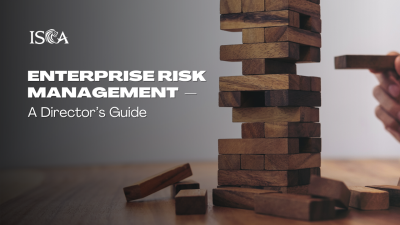
By continuing to use the ISCA Academy website, you agree to the use of cookies in accordance with our cookie policy. Cookie policy
Enterprise Risk Management - A Director's Guide
English
Last updated
Tue, 04-Mar-2025
Course Description
Recent corporate failures
have left many leaders, across industry sectors, concerned about how well their
companies are managing risk. Reviews and investigations, particularly of
companies in regulated sectors, has sometimes uncovered weak governance
structures and inconsistent risk and control environments.
This, coupled with other
major geopolitical and global events of the last few years, has led to renewed
interest in enterprise risk management (“ERM”) programmes. ERM programmes are intended to formalise how
risks are identified, assessed, managed, monitored and reported keeping view
the organisation’s strategic priorities. However, it is generally witnessed that ERM
programmes are not able to rise up to the challenge, either losing momentum or
lacking adequate investment and consequently failing to meet the expectation of
the key stakeholders.
An effective ERM programme can
assist the board and management make more informed decisions in the face of
uncertainty. Even though companies operating
in industries that are not regulated may not always have a matured ERM programme,
it is however, safe to say that even if a company lacks a sophisticated ERM
programme, certain simple easily identifiable and implementable actions
involving management can assist boards face the evolving risk landscape with the
necessary confidence and positivity.

David Toh
Course Rating
Speaker's Rating


Lesson
3
You have not enrolled to the BOD Programme!
Please click to sign up.
You have not subscribed to the BOD Library!
Please click to subscribe.

Succeed and lead with confidence as a board member. Empower yourself with up-to-date directorship training.
